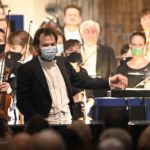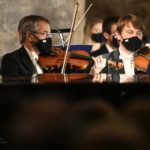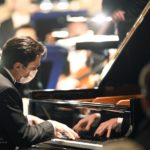Pianist Romanovsky and the Janáček Philharmonic Orchestra enchanted the audience in Opava
(review is taken from the portal KlasikaPlus.cz, author Milan Bátor, photo by Ivan Korč, October 8, 2020)
The Janáček Philharmonic Orchestra Ostrava performed in Opava on Wednesday. The St. Wenceslas Church is a traditional venue for cultural events like this thanks to its acoustic properties. The Janáček Philharmonic and the conductor, Petr Popelka, performed in the neighboring town together with a young Russian pianist, Alexander Romanovsky. Composers György Ligeti and Sergei Rachmaninov were on the program.
The main guest conductor of the Janáček Philharmonic, Petr Popelka, has already introduced himself in a good light in the new season and he also continued in a similar spirit in Opava. The Hungarian composer Ligeti belongs to those artists who had to go through traumas of totalitarian regimes and loss of home. “I don’t belong anywhere, I belong to European intelligence and culture,” was the composer’s answer to a question about his roots and origin. His music reflects the entire labyrinth of 20th-century music, to which Ligeti lent his sense of humor, perfectionism, and originality. In the early 1950’s, the composer studied Hungarian and Romanian folklore. One of the pieces on his research is Romanian Concerto (1951), which is the composer’s first major work for orchestra. The composition mixes authentic Romanian folklore with Ligeti’s own ideas in the spirit of country bands and it excels thanks to its exciting melodies and captivating rhythm.
Petr Popelka and the Janáček Philharmonic Ostrava performed the Romanian Concerto with vitality and energy. Popelka nicely constructed the contrast of the meditative first sentence and emphasized the sparkling humor and temperament of the second sentence. The players of the Janáček Philharmonic performed Ligeti’s work with a great sense of understanding for its neo-folklore ambitions. In particular, the first violin of the concertmaster (in this case, brilliantly and stylishly performed by Pavel Doležal) has numbering, melodic ornaments, and counterparts in its part, all in a rapid tempo. It turned out that the Janáček Philharmonic does not lack experience in the interpretation of folk music, and they have it in their blood. The French horn part and several other instruments were also played with great charm. The performance of the Janáček philharmonic under the direction of the charismatic and enthusiastic Popelka was truly predatory and unrestrained. The use of acoustics by positioning wind instruments also behind the listener’s back was an excellent idea. From today’s point of view, it is incomprehensible that the Hungarian communist censorship once banned this composition because of the dissonance in the last sentence, but it is important to remember things like this.
The concert continued without a break with Sergei Rachmaninoff’s Piano Concerto No. 3 in D minor, Op. 30, performed by a young Ukrainian Alexander Romanovsky. The 36-year-old pianist is described by music critics as “an exceptionally gifted, gentle artist with a captivating and engaging expression.” During his career, Romanovsky has managed to play alongside dozens of prestigious orchestras conducted by big personalities, such as Valery Gergiev. Among other things, he released a gentle solo album Childhood Memories that was inspired by musical returns to childhood.
Sergei Rachmaninoff’s concerts are the cornerstone of every world pianist’s repertoire. All are in minor tones, which illustrate the famous pathos and nostalgia of Russian music. Romanovsky started after a brief orchestral introduction with a unisono theme in octaves of both hands. I have no idea if the conductor set a faster tempo than they agreed on, but his interplay with the orchestra was noticeably uncertain at first. However, the Russian pianist “fine-tuned” the rhythmical details soon and recognized all the specific features of Rachmaninoff’s piano style. He turned out to be a technically extremely well-equipped player who had the whole swirling whirlwind of fingers in octaves, passages, and ornaments firmly under control. Romanovsky also impressed with his sense of beautiful sound and a massive dynamic range, which in places amazed with its intensity and flexible coherence with the orchestra. However, I personally felt a certain inner emotional shortfall in his performance, which manifested itself in the occasional mechanicalness and coldness of his expression. Perhaps it was all caused by the difficult conditions. Interior acoustics of the St. Wenceslas Church has an effective reverberation, but it makes it difficult to hear the whole orchestra comfortably. In addition, Romanovsky played an extremely demanding concert in a tight-fitting face mask, which certainly did not add to his comfort. The accumulated tension dropped from him during the harmoniously remarkable second sentence. During the final sentence, the pianist already allowed himself to look at the frescoes on the ceiling of the church during the break and he energetically brought the concert to a happy conclusion.
Romanovsky truly enchanted the Opava audience. Although his contact with the listeners was relatively cautious and lukewarm, his play was characterized by monumentality and robust massiveness, which amazed them. His interpretation never sounded self-serving, but permanently modeled the solo part. Romanovsky did not pretend his emotions, his performance was rather introverted, yet his conception did not miss the dynamics and expression, two key attributes of this work.
For the encore, Romanovsky also chose Sergei Rachmaninoff’s music – Prelude in G minor, Op. 23, No. 5. There was considerable relief in his play this time when the tension of the demanding performance finally disappeared. The Janáček Philharmonic Ostrava and the charismatic and friendly conductor, Petr Popelka, performed excellently. This outstanding orchestra has the romantic repertoire and neo-folk styled compositions completely under control with the ability to properly enjoy the interpretation. Romanovsky will also perform with the Janáček Philharmonic Ostrava today, on Thursday, October 8, in Ostrava. It will certainly be interesting to watch how the concert sounds in the acoustically more favorable space of the House of Culture Ostrava.







